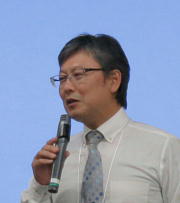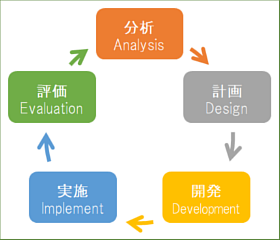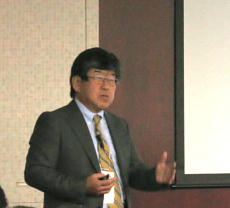Event Reports
The 3rd JST Workshop "Promoting Activities toward Research Integrity - Considering the Goals, Contents, and Methods of Research Ethics Education" Report (4 Sep '18, 19 Sep '18)
The 3rd JST Workshop "Promoting Activities toward Research Integrity - Considering the Goals, Contents, and Methods of Research Ethics Education "was held in Tokyo on 4 September 2018, and Osaka on 19 September, 2018.
Nineteen five researchers responsible for research ethics education in universities and research institutes participated in the seminars and considered what kind of research ethics education should be provided to solve organizational issues.
Learning and educational goals in research ethics education

At the beginning of the lecture, Prof. Kobayashi of National Institute of Technology, Kumamoto College gave a lecture titled, "Educational goals in research ethics: Starting with examples of engineering ethics," in which he covered learning and educational goals in research ethics education based on his specialization, engineering ethics education.
Regarding research ethics education, some think that research ethics is supposedly unattainable even if it is correct, or that everyone already understands it even if they are not educated on it. However, even if one understands research ethics, they cannot say that they have learned research ethics if they cannot act on it correctly. Prof.. Kobayashi said that to allow the audience to make appropriate decisions regarding actual ethical issues and put their education into practice, research ethics instructors need to make clear learning and educational goals before designing research ethics education program.
Specifically, learning, and educational goals are divided into three broad categories: Knowledge and understanding, abilities and skills, and values and attitude. Teaching these in combination fosters the audience's ability to make judgments autonomously and independently.
To judge and respond appropriately in the face of ethical problems, it is necessary to have knowledge and understanding related to the problem, the abilities, and skills necessary to analyze and judge situations appropriately, and the values and attitude necessary for the qualities and attitude to act on the judgment.
Designing a research ethics education program

instructional design (ADDIE model)
After setting the learning and educational goals, analyze the current situation of the organization or institution and design a research ethics education program.
As an example, Prof. Kobayashi explained one educational engineering model that had a five-step cycle: analysis, design, development, implementation, and evaluation (see diagram on the right). The research ethics education program is revised and developed by analyzing the audience's characteristics, learning progress, and other factors; designing by putting together subjects to teach and teaching methods; developing by preparing teaching materials and a learning environment; implementing the training; and finally evaluating by measuring the educational effects.
In this model, it is necessary to decide on learning activities and evaluation methods that fit the category of the learning and educational goals. For example, if one of the goals is knowledge and understanding, it is recommended that the audience obtains knowledge through lectures and e-learning, and written tests be used as an evaluation method to measure how much knowledge they have retained. Or, if one of the goals is abilities and skills, the audience can analyze problems and do ethical decision-making training through the case method and group discussions, and their progress can be evaluated through reports and oral tests.
| Goal category | Example of learning activity | Example of evaluation method |
| Knowledge and understanding | Lectures and e-learning | Written tests |
| Abilities and skills | Case method and group discussions | Reports, oral tests, self-assessment, etc. |
Research ethics education related to values and attitude
Prof. Kobayashi talked about learning activities in the values and attitude category and explained a method of making participants think, starting with understanding the word "responsibility. "There are two types of responsibility: "Duty or obligation," responsibility that is given externally as a duty, and "commitment," responsibility that one accepts as a duty. The latter is responsibility that a person chooses and acts upon of their own will.
The professor explained a method of implementing learning activities that involves discussing accidents and scandals, as well as concrete positive examples such as contributions that scientific and technological development have made to society, and whether their results came from simple obligatory responsibility or were born from voluntarily chosen responsibility based on a bigger, intrinsic necessity. He said that this will allow the participants to imagine what kind of scientist they want to be and think about and retain their own values and attitude as scientists.
Group work 1: Developing a research ethics education program (learning and educational goals)
Before the workshop, the participants had prepared descriptions of the research ethics education in their own organizations and their issues. After Prof. Kobayashi's lecture, they did independent work in which they classified the research ethics education in their organizations into the three categories of learning and educational goals and analyzed which educational goals they needed to pursue further to solve their organization's issues.
Then they formed groups of five to seven people and came up with a research ethics education program in a fictional research organization. Each participant shared with the group the current issues and other information they analyzed as part of their individual work, picking out major issues. Based on the issues, they picked some for their fictional organization and discussed the learning and educational goals of its program, what to include in it, and who the participants would be.
During the group presentations, the fictional organizations had issues such as being skewed toward education on knowledge and understanding, or the participants being unaware that research ethics applies to them.
The groups had different ranges of participants, including students, faculty members, and every member of the organization. One group mentioned that it is necessary for veteran faculty members and researchers to learn research ethics now if they did not have a chance to do so when they were young.
Many groups wanted to incorporate abilities and skills and values and attitude into their learning and educational goals to solve issues.
Specific examples of research ethics education programs (Tokyo Institute of Technology)

In the afternoon, Prof. Fudano of Tokyo Institute of Technology gave a lecture titled "University-wide Research Ethics Education: Initiatives at Tokyo Institute of Technology," explaining the university's new initiatives and plans as examples of parts of its research ethics education program. The university began implementing university-wide research ethics education programs in 2019.
Its programs are divided into three levels, one for students in years 1 to 3 of undergraduate school, those in year 4 or the master's program, and those in the doctoral program (see figure below). Its learning and educational goals are broadly classified according to their content as either integrity in science, researchers' roles and social responsibility, responsible research activities, or legal compliance, each with its own objectives and teaching methods for each level. The objective of Level 3, the final one, is to be able to teach research ethics to others in addition to the goals of Level 2.
| Level 1 | Undergraduate years 1 to 3 |
| Level 2 | Undergraduate year 4 and master's program |
| Level 3 | Doctoral program |
The basic idea of the teaching method is to conduct research ethics education through the entire curriculum and at every opportunity. It utilizes existing resources such as compulsory subjects and ethics-related subjects (e.g., Scientific and Technological Ethics and Bioethics), and incorporates elements of research ethics into guidance and orientation sessions.
Furthermore, in order to let students, learn research ethics in places where they do research, the university will add a workshop to its graduate program that lets students learn about abilities, skills, values, and attitude using the case method and devise their own research ethics program for their laboratory. Through this workshop, students can understand that research ethics should be considered and put into practice in places where they do their research. In addition, the university plans to train faculty members (principal investigators) directly in the future since their cooperation is required.
Tokyo Institute of Technology has six graduate schools covering various fields (plus the Institute for Liberal Arts and the Institute of Innovative Research). To respect each graduate school's field characteristics and independence, the main office provides them with choices of education methods to use while planning specifically what they will teach and how they will teach it.
As a method of evaluating and confirming the effectiveness of their research ethics education, they also plan to let trainees perform self-inspections to judge whether they achieved their learning and educational goals using a checklist and have them checked by an advisor.
Throughout these initiatives, there will be explanations on e-learning materials for knowledge and understanding, case method materials and workshops for abilities, skill, values, and attitude, corresponding to the three categories of learning and educational goals.
Group work 2: Developing a research ethics education program (method)
In the second group work session, participants thought about methods, schedules, and other items necessary to achieve the learning and educational goals established in the first group work session while referring to Prof. Fudano's lecture. They thought about difficulties in implementing the items they came up with and thought about why they were difficult and how to address them.
Many of the groups established learning and educational goals for issues such as overemphasis of knowledge and understanding or e-learning losing meaning that involved improving the participants' judgments, skills, values, and attitude, making them aware that research ethics applies to them, and having them act proactively.
The audience suggested concrete methods of making the participants keenly aware of research misconduct and research ethics, such as using "THE LAB" and other video materials or using examples relevant to the participants. A group also proposed giving positive examples in order to motivate the participants as scientists.
Another group thought of making opportunities for participants to be involved in research ethics focusing on topics that the participants are interested in, such as telling other laboratories about successful projects in the participants' own laboratories and holding seminars on the theme of creating a good research environment. The proposals were designed to increase communication between principal investigators, students, and young researchers.
There were proposals to address faculty members and researchers who were not enthusiastic about being trained, such as encouraging them to participate by having them understand their position to guide students, encouraging students to participate in research ethics education (e.g., through group discussions), and taking advantage of mandatory meetings, such as faculty meetings.
One of the difficulties in implementation is that there is a limited amount of time to teach research ethics through seminars and lectures. To address that, some groups proposed including research ethics elements in normal lectures and teaching them through the whole curriculum and incorporating research ethics in various opportunities, such as when entering the school, applying for research funds, being assigned to a laboratory, or writing a graduation or master's thesis.
Comments by the lecturer and thoughts by the participants
After the presentation, the lecturers commented on that day's workshop.
One participant suggested that if a training course with the word "research ethics" doesn't give the participants feel a sense of obligation and positivity, the goals should be to do better research activities and train better researchers, and the education should be implemented without worrying about the title of "research ethics," and as a result, it will prevent research misconduct and promote fair research activities. They complimented it, saying that the group presentations provided valuable ideas, such as talking about successful projects and holding seminars to create good laboratories. In addition, they said that because the environments and human relationships vary from laboratory to laboratory, they do not have a uniform method of conducting fair research activities, and it is more effective to think of concrete methods for each research site individually.
Lastly, the lecturers asked the audience to remind workshop participants that they are partners, share information with the community, cooperate, and build systems that will promote fair research whenever they think about research ethics education.
The participants gave positive comments through the questionnaire, such as "I focused only on knowledge-based ethics education, but now I have new perspectives," "I learned by hearing about situations in other organizations," and "I think this will help me make a concrete research ethics education program."
Related articles:
- The 2nd JST Workshop, "Promoting Activities toward Research Integrity-- Considering the Need for the Research Integrity and Its Educational Programs" (Part 2) Introducing the Current Situation and Sharing a Sense of Purpose (28 Aug '17)
- The 2nd JST Workshop ", "Promoting Activities toward Research Integrity-- Considering the Need for the Research Integrity and Its Educational Programs" (Part 1) Introducing the Current Situation and Sharing a Sense of Purpose (22 Sep '17)
- JST Workshop on Promoting Activities toward Research Integrity - Education in the Research Field - (8 Mar '17, 14 Mar '17)

